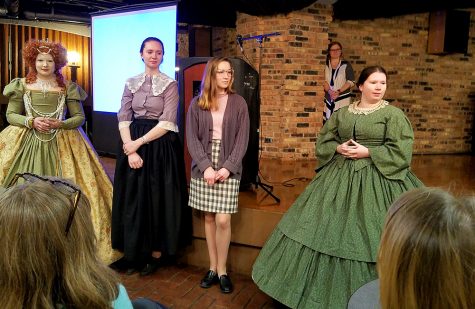Women honored at Awards Ceremony
March 27, 2019

Students in the Living History Project perform Wednesday night at the Women’s, Gender, and Sexuality Study Awards Ceremony at the 7th Street Underground.
The Women’s, Gender, and Sexuality Studies Awards Ceremony held at the 7th Street Underground honored empowering women who are students, faculty, and community members.
The women who were honored for their achievements or recognized for their research studies were nominated by colleagues or professors who have been working with them for a while, and they are creating social awareness in the community through their work.
The #MeToo movement, the theme of the Women’s History and Awareness month, was one of the focus points in the presentations.
Melissa Ames, one of the WHAM committees, said #MeToo is a fitting theme for WHAM, since it is sparking a type of complicated critical cultural critic that they aim to engage the students in.
Jeannie Ludlow, the faculty winner of Women of Achievement award, informed the crowd in her acceptance speech that she has been thinking about what the word “achievement” means in an intersectional feminist context.
Ludlow proposed to the audience, “We feminists think critically and creatively, about how we want to define achievement intersectionally at this moment in our history and at this place in our campus.”
She defined achievement in two ways; she said first it is collective, and second it is achievements that deplete people.
Four student performers from the Living History Project, which has been around since 1999, talked about what it was like portraying those important women they connected with and performing for children in the Charleston elementary and middle schools.
Kamae Coffey, an middle level education major, portrayed as Nellie Bly, who was an investigative journalist who reported how mental asylums treated their patients through faking mental illness, chose her because she wants children to know the power of words.
Ludlow shared when she was in third grade, her father told her she had organized a protest at school, but she did not recall ever doing it.
She said she can imagine where the idea came from because in 1969 when she was in third grade, she said the news in the previous years were about protests and rallies.
One of them, Ludlow said, was the feminist protest at the Miss America pageant that she saw on television, which taught her how people around the world struggle how to make this world a better place.
“That digital activism on the television is what taught me what being a humanist was,” Ludlow said. “I do not want to discount that ever.”
Valentina Vargas can be reached at 581- 2812 or vvargas@eiu.edu.



















![[Thumbnail Edition] Senior Foward Macy McGlone, getsw the ball and gets the point during the first half of the game aginst Western Illinois University,, Eastern Illinois University Lost to Western Illinois University Thursday March 6 20205, 78-75 EIU lost making it the end of their season](https://www.dailyeasternnews.com/wp-content/uploads/2025/03/WBB_OVC_03_O-1-e1743361637111-1200x614.jpg)















































